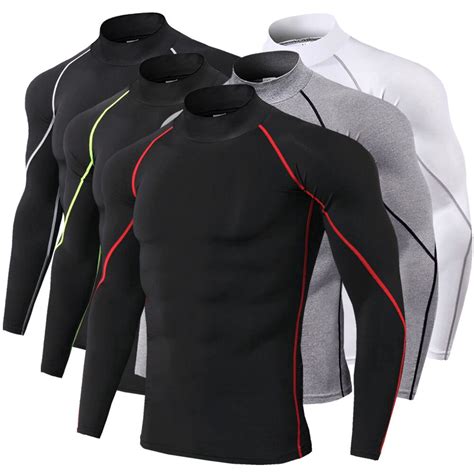How To Dry Compression Shirts
Ronan Farrow
Mar 24, 2025 · 3 min read

Table of Contents
How to Dry Compression Shirts: The Ultimate Guide to Keeping Your Gear in Top Shape
Compression shirts are a staple for athletes and fitness enthusiasts alike, providing support, moisture-wicking capabilities, and a comfortable fit during workouts. But proper care, especially drying, is crucial to extending their lifespan and maintaining their performance. This guide will walk you through the best ways to dry your compression shirts, ensuring they stay in peak condition for many workouts to come.
Understanding Compression Shirt Fabrics
Before diving into drying methods, let's understand the typical fabrics used in compression shirts:
- Polyester: A common choice for its moisture-wicking and durability. It's generally easy to care for.
- Nylon: Offers strength and elasticity, often blended with other materials for optimal performance.
- Spandex/Elastane: Provides stretch and recovery, enhancing the compression effect. It requires gentle handling to avoid damage.
- Merino Wool: A natural fiber offering excellent moisture-wicking, odor resistance, and breathability. Requires specific care instructions.
The fabric composition of your shirt will influence the best drying method. Always check the care label for specific instructions.
Drying Methods: Choosing the Right Approach
Several drying methods are available, each with its pros and cons:
1. Air Drying: The Gentle Approach
Air drying is generally the best method for preserving the quality of your compression shirts. It's gentle on the fibers, minimizing shrinkage and damage.
- How-to: Reshape your shirt after washing to avoid wrinkles. Hang it on a clothes hanger or lay it flat on a clean, dry surface away from direct sunlight. Ensure proper airflow to facilitate quick drying. Avoid using a clothes dryer, as high heat can damage the fabric.
Pros: Gentle, prevents shrinkage, prolongs shirt lifespan. Cons: Slower drying time compared to machine drying.
2. Machine Drying: A Quick but Risky Option
While convenient, machine drying can potentially damage your compression shirts. High heat can shrink the fabric, weaken the fibers, and even damage the elastic properties.
- How-to: If you must use a machine dryer, select the lowest heat setting (or "air fluff" if available) and remove the shirt promptly once it's dry to prevent excessive heat exposure.
Pros: Fast drying time. Cons: Risk of shrinkage, damage to fibers, can degrade elasticity.
3. Tumble Drying: A Conditional Option
Tumble drying should only be considered if your compression shirt's care label explicitly permits it. Even then, use the lowest heat setting and a short drying cycle. This method is generally not recommended.
Pros: Faster than air drying. Cons: High risk of shrinkage, damage, and premature wear.
Tips for Optimal Compression Shirt Care
- Always check the care label: This provides manufacturer-specific instructions for washing and drying.
- Wash inside out: This protects the outer layer from abrasion and helps maintain the shirt's color.
- Use a mild detergent: Harsh detergents can damage the fabric fibers.
- Avoid fabric softener: Fabric softeners can reduce the shirt's moisture-wicking ability.
- Don't bleach: Bleach can weaken the fabric and damage its color.
By following these guidelines, you can ensure your compression shirts stay in top shape, providing you with the support and comfort you need for years to come. Remember that air drying is always the safest and most effective method for preserving the quality of your compression shirts.
Featured Posts
Also read the following articles
| Article Title | Date |
|---|---|
| How To Detox Your Mouth | Mar 24, 2025 |
| How To Get Rust Out Of Motorcycle Gas Tank | Mar 24, 2025 |
| How To Extend A Marriage Contract | Mar 24, 2025 |
| How To Fix High Long Term Fuel Trim | Mar 24, 2025 |
| How To Cook A Pheasant In A Crock Pot | Mar 24, 2025 |
Latest Posts
-
How Fast Can Bees Make A Hive
Apr 04, 2025
-
How Fast Can A Clown Fish Swim
Apr 04, 2025
-
How Far Should Pitching Wedge Go
Apr 04, 2025
-
How Far Should My 7 Iron Go
Apr 04, 2025
-
How Far Should I Hit A 3 Wood
Apr 04, 2025
Thank you for visiting our website which covers about How To Dry Compression Shirts . We hope the information provided has been useful to you. Feel free to contact us if you have any questions or need further assistance. See you next time and don't miss to bookmark.
